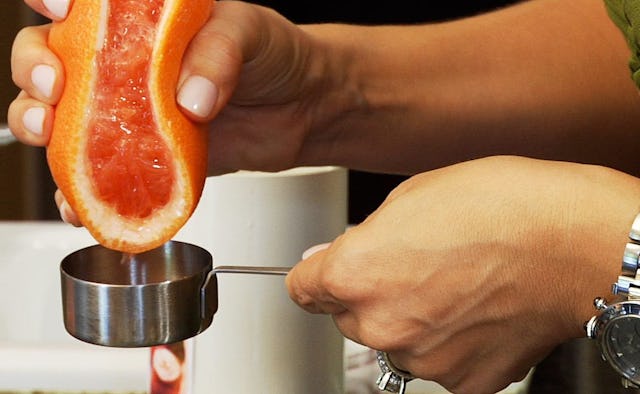How I Broke The Vicious Food Cycle In My Life

My mother was always, always on a diet.
The ’70s and ’80s are a blur of her constantly consuming cottage cheese. Hot lemon water. Pink grapefruit, and only pink grapefruit, for weeks. Brick-like rye crackers that resembled remnants of a cardboard box (and probably tasted like one, too). She never enjoyed any of it, and always felt crushed when the weight stubbornly clung to her like large burrs she couldn’t shake off. She often complained she ruined her metabolism back in the ’60s, as if it were a pair of pants with an elastic waistband: once stretched, forever slack.
Unlike this woman, whose controlling mother monitored every morsel her young daughter put in her mouth, which led to unhealthy weight wars in adulthood, my mother was fully fixated on her own calorie input. She never told me I was fat—although an aunt did grimly warn me not to go for that third piece of pizza, or I’d wind up looking just like my mom. My dad, her ex-husband, muttered similar things to me when he took us kids to Farrell’s Ice Cream Parlor during his occasional visits. I always wondered what he expected me to do: not order the hot fudge sundae? Why not take us mini-golfing instead?
No, I, like so many other girls out there, simply swallowed the messages my mother and others fed me, sometimes silently and often indirectly. We understood from very young ages that our bodies were not fully our own. That others were allowed to comment out loud about our figures, scrutinize their lines and fullness. That we needed to detach our inner selves from our outer shells and learn how to examine our stomachs, backsides, legs, arms, and later, breasts, with the clinical remove of, say, an ace butcher assessing the finest cut of meat.
The result for me was my weight wildly yo-yoed between the ages of 14 and 20. With my mother’s tortured example as a yardstick, I simply didn’t know how to eat. I certainly was not taught how to have a healthy relationship with food. My frame, which at 5-foot-5-inches is naturally on the small side, vacillated between a too-thin 105 pounds and a too-heavy (for me) 155 pounds. There was never any discussion about balance or exercise or health. In my childhood home, food was an all-or-nothing affair: painful restriction from everything that tasted good, or extra butter smeared on your fourth dinner roll.
It wasn’t until I began listening to my own natural cues—hunger pangs, thirst that could not be quenched with soft drinks, cravings for specific things like fat or meat at specific times of the day, fatigue, and, most important, satiation—that my weight leveled out. It’s now hovered between 120 and 125 pounds for more than 25 years. I consume everything I want to eat in moderation, including bread, dessert and alcohol. I’ve never gone on a diet in my adulthood, nor have I ever uttered that word to my two daughters, who are both school-age. When we discuss our bodies, we talk about scoring goals or racing to the finish line. We talk about strength, never skinniness.
Instead, I model for them how I hope they’ll face food in the future, long after they leave the nest. I’m no gourmet cook—my husband will attest to that—but my kids eat breakfast every morning, even if it’s just a bowl of Cheerios. They drink water and nonfat milk; they’ve never tasted soda in their lives. They have a mid-morning snack of apple slices or toast. They eat lunch at noon, and it’s usually a sandwich of lean meat and cheese with carrots on the side, or vegetable pasta. At 3:30 p.m., they might get Goldfish, or better, cheese sticks. Dinner is at 6 p.m. We usually serve up a piping hot chicken or fish dish paired with steamed or roasted veggies, a salad and maybe a crusty loaf. Plus they always get dessert, every single night without fail. I eat it with them. It can be cookies or a few scoops of ice cream or squares of dark chocolate. It’s not forbidden. We enjoy it together.
They eat until they’re full. Then the kitchen is closed. And none of us snack in the evening. We truly don’t need to. We’re still more than satisfied from dinner.
My kids don’t have weight problems. Even if they did, I wouldn’t frame a conversation about weight, ever. I’d talk to them about good health and why it’s so important, and announce our new walking-to-school schedule, and our cool plan to go biking together on Saturday afternoons. Something fitness-focused.
I don’t blame my mother for setting a poor example, not at all. She grew up before the information age. She didn’t have Oprah, Self magazine or WebMD.com. She, too, mirrored the negative messages society projected onto her, internalized them and reflected them back. She was never trying to hurt me or my sisters with her never-ending body battles. And I know it would hurt her to think we inherited her food issues.
I also can’t control the bombardment of media images out there, from Victoria Secret’s Angels to thigh-gap selfies, with which my girls are being deluged on a daily basis. But at least I can stop the inheritance of food issues, by not making food an issue at all.
This article was originally published on